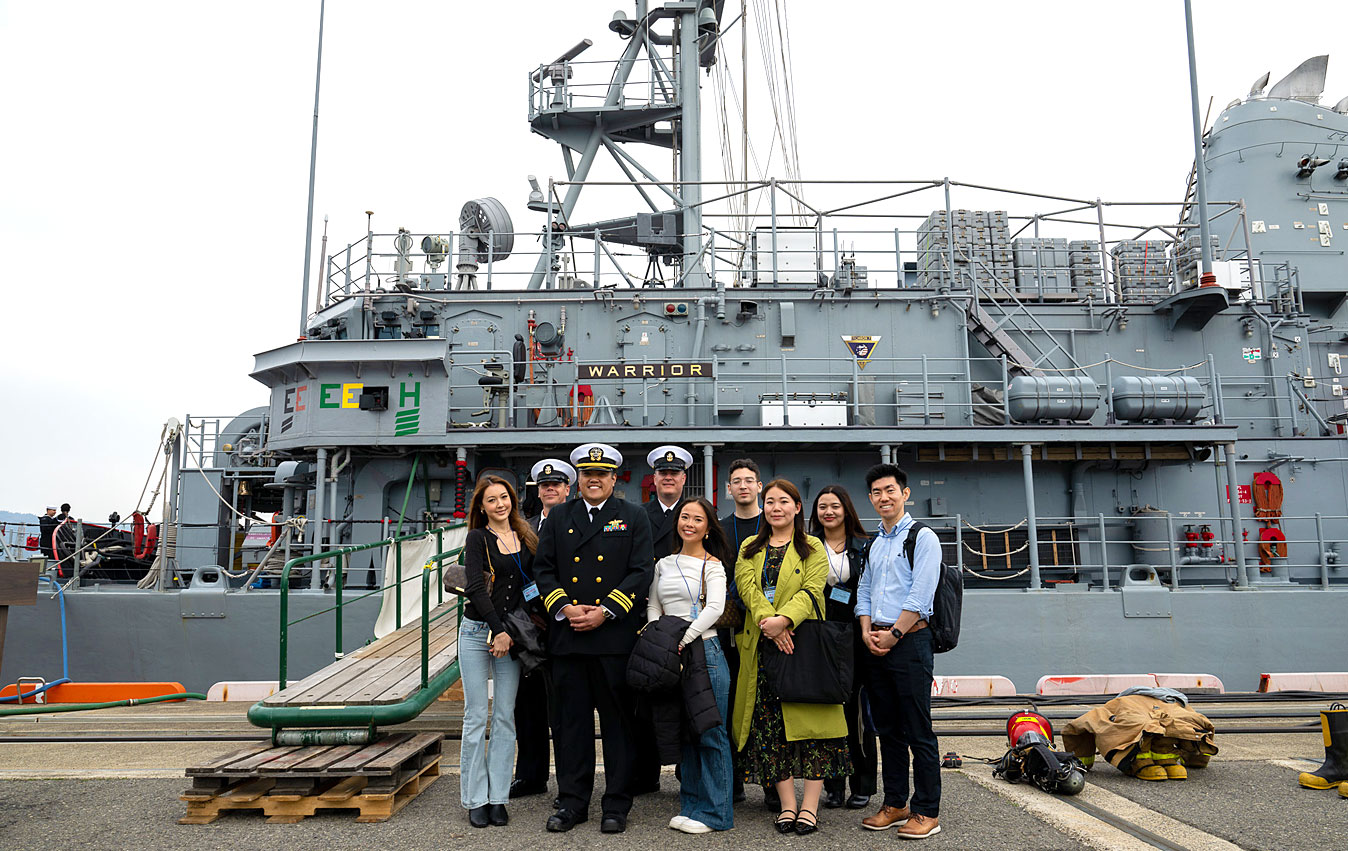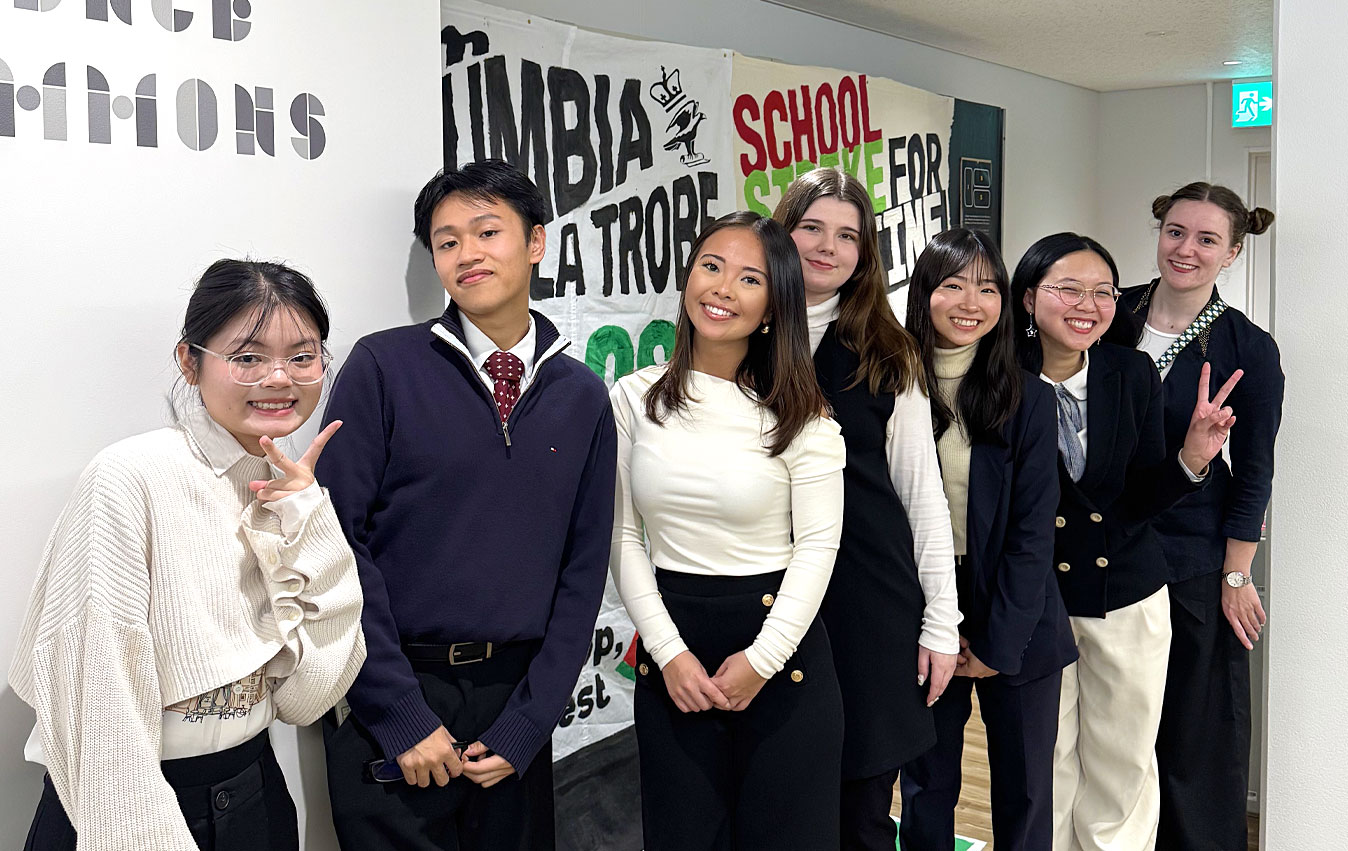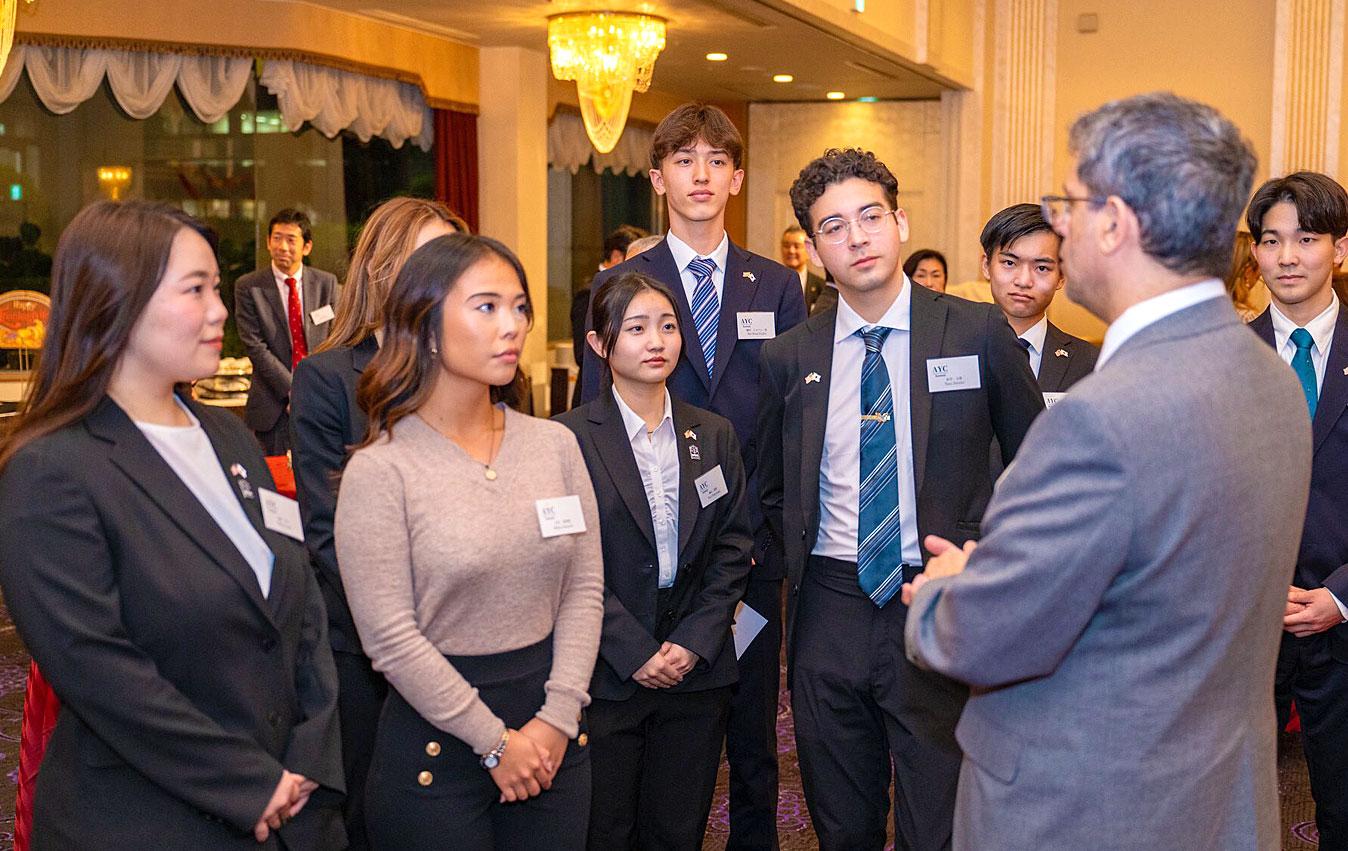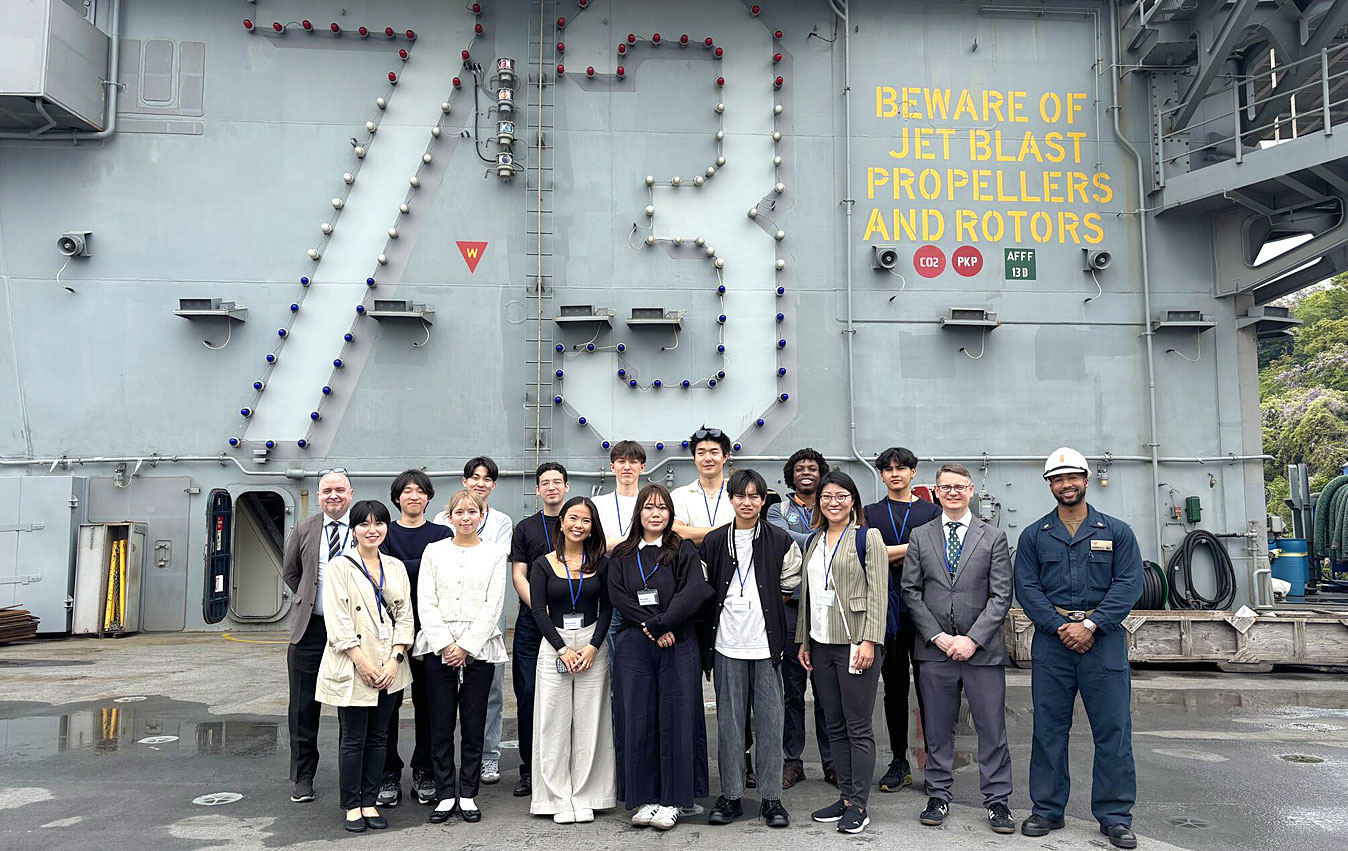
Exploring International Relations through the U.S. Consulate General Osaka-Kobe’s Ambassador’s Youth Council
AMANAI (VAN DUIJVENBODE) Milea
Fourth-year Global Studies Major
We interviewed Ms. AMANAI Milea, who has been actively involved in a variety of initiatives, including a one-year study abroad program in the United States, participation in the Ambassador’s Youth Council (AYC) at the U.S. Consulate General in Osaka-Kobe, and involvement in the Kyoto Youth Peace Program (KYPP).
What motivated you to study at the College of International Relations at Ritsumeikan University, among all universities in the world?
MileaI chose to study at the College of International Relations at Ritsumeikan University because it was the perfect place to connect my international upbringing with my academic interests while also reconnecting with my cultural roots. Having been born in Tokyo, raised in Dubai, and later moving to Montana for high school, I grew up navigating different cultures and perspectives. These experiences taught me the importance of international dialogue and understanding, and I wanted an academic environment where I could analyze global issues while building cross-cultural connections.
At the same time, moving so often meant I did not have the opportunity to deeply explore my Japanese heritage. Kyoto, with its rich history and traditions, was the ideal place to rediscover that side of my identity while pursuing my studies. Ritsumeikan stood out among universities worldwide not only for its strong reputation in international relations and opportunities to engage directly with experts but also for its diverse student body, where Japanese and international students learn side by side. Together, these factors created a unique environment that made Ritsumeikan the most meaningful choice for me.
After enrolling, how has your perception of the College of International Relations changed?
MileaAfter enrolling, my perception of the College of International Relations has deepened in ways I did not expect. While I was first drawn to its international environment and strong academic reputation, my coursework and experiences helped me discover a specific interest in U.S.-Japan relations. Engaging with professors, classmates, and opportunities outside the classroom allowed me to see how theory connects with real-world diplomacy, which shaped my academic and career goals. I also came to value how Kyoto’s cultural setting enriched this journey, giving me space to reconnect with my Japanese heritage while studying international issues.

So far at Ritsumeikan University or in Japan, how do you feel you have grown, what skills have you obtained, and what do you think you have learned?
MileaI have grown in ways that go far beyond academics. Learning to navigate both Japanese academic life and an international community has helped me gain confidence in expressing myself and contributing my own perspectives. Living in Kyoto allowed me to reconnect with my cultural roots, which is something I had not been able to do while frequently moving between countries, while also challenging me to adjust to new expectations and responsibilities. My study abroad at American University in Washington, D.C. was equally transformative, as I exchanged ideas with peers from around the world and experienced international relations from an American perspective. Together, these experiences taught me resilience, openness, and the importance of not only listening to others but also having the confidence to share my own voice in discussions on global issues.
Please share your most fulfilling activity or most unforgettable experience while at Ritsumeikan University or in Japan.
MileaOne of my most fulfilling experiences at Ritsumeikan University has been my involvement in activities that connected my studies to real-world practice. As a member of the U.S. Consulate General Osaka-Kobe’s Ambassador’s Youth Council (AYC), I had the opportunity to engage directly with U.S. diplomats and Japanese officials on issues shaping U.S.-Japan relations.
MileaA highlight was our Tokyo trip, where I visited the U.S. Embassy, met with government officials and business leaders, and also toured the U.S. Naval Base in Yokosuka. These experiences gave me a deeper understanding of how diplomacy and security cooperation operate behind the scenes, and they highlighted the importance of people-to-people connections in strengthening bilateral ties. Being part of AYC gave me the confidence to voice my own perspectives and solidified my interest in pursuing a career in international relations.

MileaAt the same time, my work with the Kyoto Youth Peace Program (KYPP) was equally meaningful. I coordinated a three-week exhibition at the Kyoto Museum for World Peace that brought together student-led organizations from all around the world. My role involved managing the collaboration process, creating bilingual materials, and ensuring that each group’s message was conveyed clearly and respectfully. This experience taught me how student initiatives can foster awareness and dialogue on global conflicts, while also sharpening my skills in cross-cultural communication and project management.

MileaAdditionally, through Ritsumeikan Global Supporters, I supported international students by translating documents, planning events, and helping to create a welcoming environment on campus. Together, these experiences have been unforgettable because they showed me how international exchange can take many forms, through diplomacy, grassroots collaboration, and community building, which also motivated me to continue pursuing opportunities that bridge cultures and perspectives.
Please tell us about your experience studying abroad at American University. Is there any moment that highlights your study abroad?
MileaStudying abroad at American University in Washington, D.C. was one of the most unforgettable parts of my university experience. What stood out most was the friendships I made with people from all around the world. Being able to share perspectives inside and outside the classroom, and even visiting some of these friends later in Europe, showed me how strong and lasting international connections can be. I am still in touch with many of them today, and those relationships are something I will always be grateful for.
Another highlight was the quality of education I received. Many of my professors had remarkable professional backgrounds and direct experience in the field of international relations, which gave me insights that went far beyond textbooks. Learning from them not only expanded my academic knowledge but also inspired me to think more critically about global issues and how theory connects with real-world diplomacy.
Because of this, I always recommend studying abroad to anyone considering it, as it is an experience that challenges you, broadens your worldview, and gives you friendships and lessons that last a lifetime.

Could you send some messages to prospective students for the College of International Relations at Ritsumeikan University?
MileaStudying at the College of International Relations at Ritsumeikan University has been one of the most rewarding experiences of my life. What makes the program unique is not only its strong academic foundation but also the community you become a part of. You will have the opportunity to learn from professors with diverse expertise, engage in discussions with classmates from around the world, and connect theory with real-world issues.
Living in Kyoto also adds to the experience, as it is a city rich in culture and history, offering a perfect balance between tradition and modern student life. Beyond the classroom, there are countless opportunities to get involved in activities, organizations, and projects that help you grow personally and professionally.
If you are considering studying here, I encourage you to take the leap. It will challenge you, broaden your perspective, and give you friendships and experiences that last a lifetime.

September 2025
MORE INTERVIEWS
-
International collaboration is not merely an ideal, but something that is both achievable and essential
Tran Duc Tuan (Steven)
Honda (Graduate School of International Relations Alumnus 2015)2026.2.13
alumni|
-
Zemi Research Convention 2025 “Where do we find the laughter?”
JDP Team
(Team name: The Japarican: Trans-Pacific Humor Accord)2026.2.3
academics|jdp|openseminar|
-
Diversifying opportunities and improving oneself by crossing borders
Jameel Mikaheel Yamaguchi
Fourth-year Global Studies Major2026.1.26
studyabroad|international|gs_major|
-
I participated in the Peace Studies Seminar and engaged in meaningful discussions with peers who shared a commitment to deepening our understanding of peacebuilding and broadening our perspectives.
ONG Kristen Valeria
Second-year Global Studies Major / International Student from Singapore2025.11.5
studentlife|academics|gs_major|
-
The Bangkok International Organization Training Program Taught Me the Importance of Understanding Regions from a Broad Perspective — I Aspire to Build a Career in International Politics
RINALDI Christian Giuseppe
Second-year Joint Degree Program (AU-home)2025.10.22
academics|international|jdp|
-
Developing my Japanese proficiency enabled me to engage in a wide range of experiences during my time in Japan.
DAO NGUYEN BAO Ngoc
Third-year Global Studies Major / International Student from Vietnam2025.9.26
studentlife|international|gs_major|